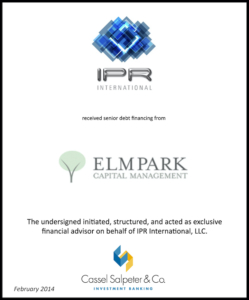Family offices are seizing more opportunities in middle-market M&A, so keep an eye out for them
Click here to view the original article.
By James S. Cassel
February 16, 2014

James Cassel
NEED A SMALL BUSINESS MAKEOVER?
If you would like a makeover, here’s what you need to do:
• Tell us why your business needs a professional makeover. No more than 250 words, please. Concentrate on one aspect of your business that needs help, and tell us what your problems are.
• You must be willing to share company information with our consultants so they can help you. (Businesses selected for makeovers will need to fill out a short financial form.)
• The makeover is open to anyone who has been in business at least two years. No start-ups.
• The business must be your primary source of income.
• Your venture must be in Miami-Dade or Broward.
• E-mail your request to ndahlberg@Miami Herald.com and put ‘Makeover’ in the subject line.
When middle-market business owners begin looking outward for potential investors or buyers, they often limit their searches to a lineup of the usual suspects: private equity firms, venture capitalists, strategic buyers, and so forth. But often overlooked alternative investors — family offices — can be a good fit for those seeking investment relationships with longer term horizons and less complicated approval processes. South Florida in particular has a growing group of family offices. Family offices primarily manage the family affairs of ultra-wealthy families and make investments and asset allocations on their behalf. Their duties can also extend beyond this to include managing philanthropic efforts, the family’s many homes and bills, and estate planning.
Cascade Investment was established to serve as Bill Gates’ family office, Michael Dell employs 80 people at his own MSD Capital, and Oprah Winfrey hired notable investment manager Peter Adamson in 2010 to run operations at her family office. According to a recent article in Forbes, single-family offices are arithmetically multiplying, and with the wealth or influence they control, they are probably exponentially multiplying. Moreover, single-family offices currently oversee a larger pool of investable assets than all the hedge funds today combined.
Traditionally, family offices have been primarily focused on managing assets through the selection of the right investment managers to conduct their asset allocations. Recently, however, driven by many factors including historically low yields in fixed-income markets as well as volatility in equity and commodity markets, family offices have begun to make more direct investments in mid-market businesses.
While most family offices are the result of a family selling its principal business, others were formed as a method of diversification by taking substantial capital out of the business to diversify its investment holdings. Some family offices may limit themselves to specific industries and business verticals with which they are familiar. For example, if the family sold a manufacturing company, it may impose that limitation and discipline on itself to only look outward to similar ventures where it has relevant experience to make direct investments. In turn, these family offices can be intimately knowledgeable partners in certain verticals.
Whatever the case, family offices represent strong potential sources of buyers and capital for organizations looking to expand or sell. Generally speaking, family offices don’t often have the same kind of time horizons as private equity firms. This is for fairly transparent reasons: Family offices take a longer term view of the businesses they buy. Those family offices that have acquired businesses with stable long-term growth have no reason to look toward fast-approaching liquidity events. It’s in their best interest to cultivate longer horizon investment relationships that will provide consistent returns. Selling a growing business would just require them to redeploy the assets and face all the inherent risks of making new investments.
Private equity firms, on the other hand, are not investing their own capital, and as a result, they typically acquire with a four- to seven-year time horizon in mind. They raise money with the expectation that they will invest during a five-year period and exits or sales will take place during the four to seven years after they acquire. The funds have a finite life. As private equity firms go to market periodically to raise their next fund, they need to show their historical returns in order to garner interest from potential investors.
Another important difference between family offices and private equity firms is that the former can be distinctly agile decision makers. Private equity firms are far more formal, have investment committees and require multiple rounds of approvals before definitive action may be taken. On the other hand, family offices generally boil down to one or two key decision-makers who can act and react nimbly with executive authority. Additionally, family offices don’t have stiff fund structures.
Multi-family offices have also become more prevalent in recent years, as have more robust options for those seeking to establish their own family offices. For example, GenSpring Family Offices, an affiliate of SunTrust Banks, provides highly customizable wealth management advice and service options for single-purpose and multi-function family offices, ranging from multi-generational sustainment to administrative management, and more.
Without a doubt, family offices offer key differentiators and benefits as prospective partners and buyers. Middle-market business owners seeking capital sources from flexible partners with a sharp focus on their industries and the proclivity to make long-term investments should keep family offices in mind along with private equity firms. Wondering how you can find and access them? It is not easy. Unlike private equity firms, they are harder to find, as many try to fly under the radar. However, as they get more active, they become more visible. Therefore, a good start is reaching out to trusted investment bankers, attorneys, accountants and other plugged-in advisors who can help get you connected.
James Cassel is co-founder and chairman of Cassel Salpeter & Co., LLC — www.casselsalpeter.com — an investment-banking firm with headquarters in Miami that works with middle-market companies. He can be reached at jcassel@casselsalpeter.com




